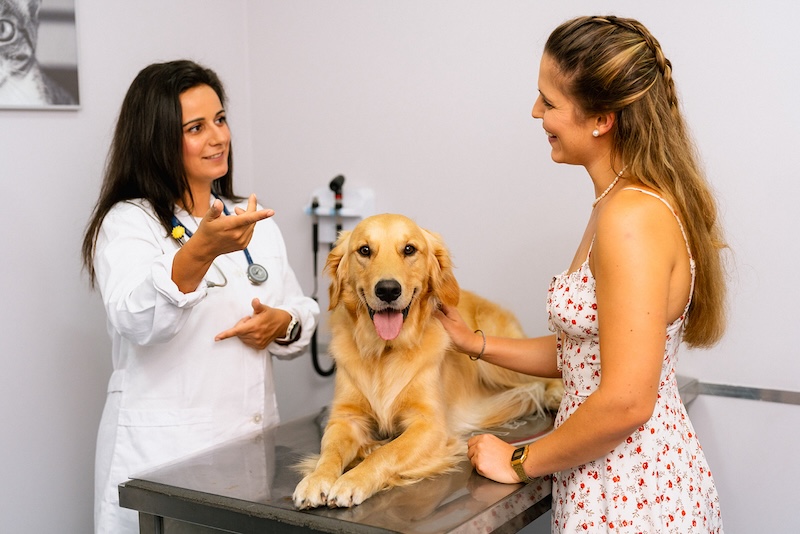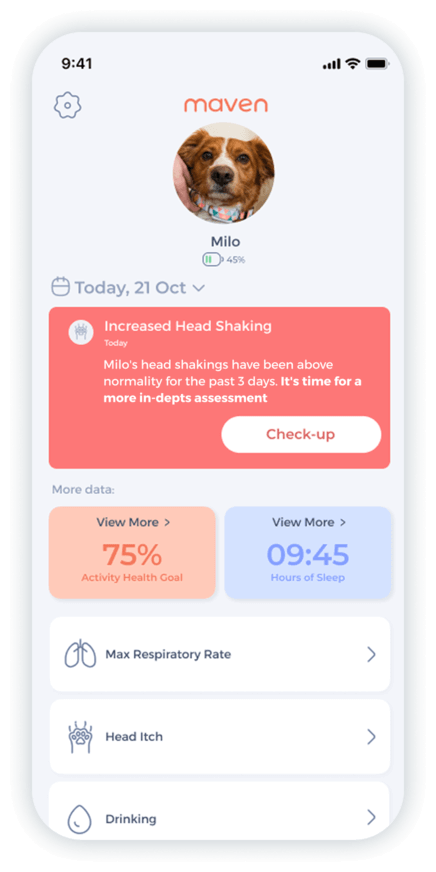Paw Parent’s Guide to Diabetes in Dogs
Caring for a dog diagnosed with diabetes can feel overwhelming, but diabetes in dogs is a manageable condition.
Once you understand how diabetes works and what to do to minimize the symptoms, you can provide a happy and healthy life for your furry friend.
With early detection, proper treatment, and regular monitoring, you can ensure your pet lives a comfortable life.
Nowadays, there are devices, such as Maven’s smart dog collar, that can help you monitor your pet’s health metrics, which makes early detection of issues much easier.
This guide will explain the fundamentals of diabetes in dogs, including its symptoms, causes, and treatment.
“I got the Maven sensor for my 14-year-old Chihuahua mix with heart and trachea issues. It gave me back peace of mind – I can track her RRR, BPM, drinking, and activity anytime and know instantly if something’s wrong. Highly recommend!”

★★★★★
Chiara De Luca
Titti
- Diabetes in dogs is manageable with early detection, proper treatment, and regular monitoring.
- Recognizing early symptoms, like increased thirst and weight loss, is crucial for timely intervention.
- Maven Pet's monitoring technology aids in tracking health metrics and detecting issues early.
- Effective management includes insulin therapy, dietary adjustments, and a consistent exercise routine.
What is Diabetes in Dogs?
Diabetes in dogs occurs when the body is unable to regulate blood sugar levels due to problems with insulin—a hormone that helps glucose enter cells for energy.
Without adequate insulin, glucose builds up in the bloodstream, leading to health complications.
Dogs typically experience Type 1 diabetes, where the body’s immune system attacks and destroys the cells in the pancreas that produce insulin.
With Type 2 diabetes, the body becomes resistant to insulin, or the pancreas doesn’t produce enough insulin to meet the body’s needs.
Understanding the type of diabetes affecting your dog is key to effective treatment.
Symptoms of Diabetes in Dogs

Recognizing the early signs of diabetes is the key to intervene quickly and safeguard your pet’s health.
Some of the most common symptoms of diabetes in dogs you should look out for include:
- Increased thirst and frequent urination
- Unexplained weight loss, even with normal or increased appetite
- Lethargy or reduced activity levels
- Cloudy eyes, potentially indicating cataracts
Monitoring your dog’s daily habits can help detect these changes early, prompting you to act immediately to reduce the impact of this condition on your pet’s well-being.
Maven’s Pet Wellness technology can help you: this device provides tools to track activity levels, hydration, and other health metrics, thus offering insights that could signal health issues like diabetes.
Diabetes in Puppies
Although diabetes can affect dogs of any age, diabetes in puppies is highly unlikely. However, it’s not impossible to find puppies with diabetes, and it presents unique challenges due to their developing bodies and heightened nutritional needs.
Symptoms of Diabetes in Puppies
There are signs you should pay attention to in order to find out if your puppy might have diabetes. Some of the most common symptoms are:
- Stunted growth
- Weakness or low-energy
- Digestive issues
Caring for a diabetic puppy requires close veterinary supervision and careful attention to diet and insulin therapy. Maven Pet monitoring system can help you significantly, as it continuously tracks your pet’s vital health metrics.


Monitor heart rate, respiratory rate, activity & rest, drinking, itch behavior.
Diagnosing Diabetes in Dogs

If you suspect your dog may have diabetes, early veterinary intervention is essential. The diagnostic process typically includes:
- Physical Examination: Your vet will assess your dog’s symptoms and overall health.
- Blood and Urine Tests: These tests detect elevated glucose levels, a hallmark of diabetes.
- Advanced Monitoring: Regular tracking of weight, hydration, and behavior changes can support early diagnosis.
Maven Pet enhances this process by monitoring your pet’s activity in real-time and providing continuous health insights.
Diabetic Dog Care
Managing diabetes in dogs requires a combination of medical, dietary, and lifestyle adjustments. With a few care tips, you can ensure your diabetic pet stays healthy and happy:
Insulin Therapy
Most diabetic dogs need regular insulin injections to maintain healthy blood sugar levels. Your vet will guide you on dosage and administration techniques.
Dietary Adjustments
A balanced diet high in fiber and low in simple carbohydrates helps regulate blood sugar. Consistency in meal timing is equally important to align with insulin schedules.
Exercise Routine
Regular, moderate exercise helps manage weight and improves insulin effectiveness. Avoid sudden or intense activity changes, as these can affect blood sugar levels.
Maven Pet’s continuous monitoring capabilities simplify diabetic dog care by tracking daily activity, hydration, and potential health deviations, alerting you to any concerns. These insights can make all the difference in ensuring your dog’s condition is well-managed and complications are minimized.
Final Notes

Understanding and managing diabetes in dogs is crucial for their long-term health and happiness.
Diabetes can affect dogs at any age, but it’s a manageable condition as long as you recognize early symptoms–such as increased thirst, frequent urination, and unexplained weight loss–and provide consistent care.
From recognizing early symptoms to providing consistent care, pet parents play a vital role in their dog’s well-being.
Tools like Maven Pet can be your best ally. Maven Pet’s tracking system enhances your ability to stay proactive, offering 24/7 health tracking and insights that help you respond to changes swiftly.
Knowledge is power, so go ahead and read our articles about diabetes in dogs to learn how to take care of your furry friend. The more you know about diabetes in dogs, the more prepared you are!
Maven Pet focuses on improving the quality of life of our pets with technology, using artificial intelligence (AI) to enable proactive pet care. By accurately collecting and monitoring pet data 24/7 and flagging any irregularities, Maven Pet empowers pet parents and veterinarians to stay ahead of potential health issues, ensuring the well-being and longevity of our beloved companions.




